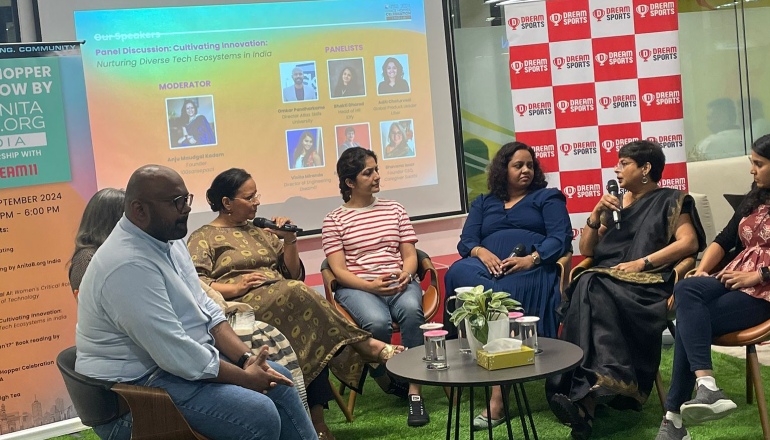Was I surprised or amused? When I walked into a room full of women, a panel dominated by women and women in leadership positions talked critically and engagingly about Diversity, Equity, and Inclusion (DEI). Undoubtedly the energy was very high at the panel, which was part of the Hopper Roadshow.
I have been part of many panel discussions over the past few years. Most of the time, the DEI discussions were dominated by men. I am not saying there is something wrong with that. But I have always wondered, wouldn’t it be logical to include the representatives of the diverse segment, including women, when the discussion is about them or for them? This time, I felt the change — in approach, the inclusion of speakers from diverse backgrounds as well as the young audience.
My panel titled “Cultivating Innovation: Nurturing Diverse Tech Ecosystems in India” saw some brilliant perspectives on diversity. I liked the way women delinked diversity from feminism. Absolutely, Diversity has a wider meaning. The term is broadly misconceived, relegated to the inclusion of women alone.
The panellists provided unique views on diversity during the discussion. They debated the missing links and emphasized the significance of the policy push for DEI to progress further. They also highlighted the importance of training to attune the team members, leaders and ecosystem—prepare them for a diverse workforce.
According to me, policies are merely blueprints. Their successful implementation is the true catalyst for driving DEI.
For example, Aditi Chaturvedi, Global Product Leader of Uber emphasized the critical role of policy in driving meaningful diversity and inclusion initiatives. “Organizations must take action to create resilient teams and individuals. DEI must be an integral part of an organization and leaders and managers must foster a culture where employees can be authentic, their true selves. This will boost performance and productivity.”
However, this is only one part of the equation. Realigning infrastructure to accommodate a diverse workforce is equally crucial. It’s a symbiotic relationship where effective policies and inclusive infrastructure must work in tandem to create a truly equitable and welcoming environment.
My other co-panellists spoke about how their organizations are taking the conscious step to include diversity at the recruitment stage itself.
They also highlighted the importance of access to quality daycare facilities closer to their workplace. This may be a small step, but it is very important if corporates want to retain and promote women’s talent; make the workplace more safe and secure etc.
The panel, also comprised of Omkar Pandharkame, Director, Atlas Skilltech University; Bhavana Issar, Founder CEO, Caregiver Saathi; Vinita Miranda, Director of Engineering, Dream11; Bhakti Dharod, Head of HR, IDfy; and was moderated by Anju Maudgal Kadam. Founder, 100sareepact.

